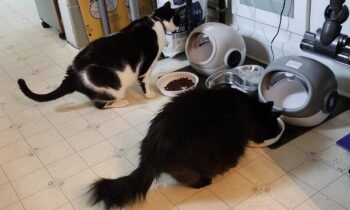
It’s true! I’ve seen very little progress this week in my campaign to “cure” my dog of bratty barking. He’s always been a barker, especially in his kennel and especially for anything he wanted that he didn’t get immediately (like being let in from the yard).
He does not bark to indicate he needs to go out to eliminate. And that’s a good thing—I prefer that my dogs give me “the look” when they need to go outside. He also doesn’t bark in a watchdoggy way, which might be because I have an older dog whose job that’s always been and who does that job very well. (My littlest dog does back up her older brother’s guard-barking—but that could be because she’s a terrier type!) I’m sure my barking brat will take over the watchdoggery when his time comes to be top dog in the household. I hope he’s paying close attention now to his older brother, who knows friend from stranger at the door, and who stops barking when I comment, “That’s enough.”
At this point, I do not trust the bratty barker to have full run of the house when I’m not available to supervise. He’s gaining ground every day on reaching that goal, though. Normally, he’s fairly well-behaved when he’s loose inside, with only sporadic counter-cruising when he thinks he smells something good up there. (He has a very keen nose, so mostly what he’s smelling is something good that was up there but has now been safely put away . . . because of him!) He is not destructive. The only things he chews are Nylabones and antlers. He will push open doors that aren’t latched but who can blame him? I latch!
He does tend toward overkill when playing with his older brother—the one who’s almost 14 and still recovering from a toe amputation six months ago. For quite some time after the surgery, I simply did not allow the two boys to have full-body contact. I stopped the wrestling before it started. That was very frustrating, I’m sure, for my bratty barker, who is five years old and wants to party! He’s still too rough, I think, but his older brother doesn’t. The older dog has learned to deal with his rascally sibling very well: he lies down to play, so he can’t get knocked over! But the younger dog is still frustrated.
While I acknowledge his frustration, there is only so much I can do. I will not allow interactions that may be harmful to my older dog. Who could argue with that stance? One thing that would help would be more exercise for the younger dog—to wear him out so much he’ll stop complaining! But it’s been abnormally hot this summer and I am not up for boiling walks in the sun myself. Instead, we do short sessions in the back yard, with me encouraging him to run and romp. He really does run when I encourage him—laps around the yard! I’ve also upped him big-time on mental stimulation: clicker-training specific behaviors (we’re working up to high fives, but he’s not a paw-y dog), food puzzles, practicing stays—during which barking is unacceptable—and lots of grooming in short sessions. I spent time with him “alone” by finding moments the other two dogs are busy elsewhere, so he gets my full attention.
He’s still frustrated, bored, antsy . . . use whatever words you want.
He barks.
He barks a lot.
He barks very loudly.
His loud barking and whining is driving me crazy!

Are we experiencing what’s called an extinction burst? Is it getting much, much worse before it gets better? I darn well hope so, but getting much worse before getting better is no fun for anyone!
Here are the rules I’ve been doing my best to follow during this very trying time for me and my dog. Every dog (and every human) is different, but if you have a bratty barker, these suggestions may help. And they all have to do with your behavior much more than with your dog’s behavior.
Dog barks at back door to come in—do not respond.
I have both a large window in the door from my kitchen and a screen door to the yard, so my dogs (the big ones) can see me when I’m still inside with both doors closed. Bratty barker is barking. I don’t look out; I wait until he is quiet. Bratty barker stops barking, I show myself in the window. Bratty barker barks at me, I move away from the window. Each step from inside the house to opening the back door to let the dog inside is a black and white situation. Dog barks, I do not proceed. If there is barking at any point, I turn away and go back inside. I wait for silence and start again. (This is the biggest favor I can do for my neighbors, who shouldn’t have to listen to the brat!)
Dog barks in kitchen for food—do not respond.
Twice last week, bratty barker did not have his dinner with the other two dogs because he was barking while I prepared their bowls. I could not ignore him, under these circumstances, because we were all in the kitchen together. The two other dogs were doing nothing inappropriate, and I had no intention of not feeding them immediately. I took the bratty barker by his collar and escorted him to a kennel, where he continued barking (the first time) for almost an hour. I tried to count to ten after each barking spree ended—he has to breathe occasionally—but after half an hour, I had done everything I had to do in the kitchen and he had not stopped barking, so I went upstairs. He eventually did quiet down and, two hours later, he got his dinner. The second time last week that he made a noisy fuss while I was preparing his meal, he got a “time out” for a little less than half an hour, when he had quieted down completely. I think he was asleep when I delivered his meal.
Dog whines or barks in kennel—do not respond. Do not respond in any way!
This is the very, very hardest challenge for me . . . which might well explain why it is also a very, very hard challenge for my dog. My first instinct is to yell at him to stop. That is just so dumb. It not only doesn’t work, it actually encourages him to “answer back” to get even a bigger reaction from me (like letting him out). I’ve never let him out for whining or barking, but I sure as heck have yelled at him a lot. Obviously, my own dumb human reaction is only making it worse.
When I say, “do not respond in any way,” I mean this: if you’re in the same room with the dog, don’t even sigh when he whines or barks. Do nothing! Don’t move from where you are, continue doing what you were doing, don’t look toward him, don’t jump, don’t mumble under your breath . . . do nothing!
Remember, any response is encouragement to the dog. “She heard me. I made her jump. I’ll make more noise!” The point of not responding in any way is to make the dog look for other alternatives for getting your attention. The only alternative you’re seeking is total quiet. Once you get total quiet, leap for that kennel and let the dog out! He succeeded and you rewarded—increasing the chances that the next time he is frustrated and wants out of the kennel, he might not whine or bark. I’ve been working very hard to make those “quiet moments” rewarding even if I don’t let him out. For example, he was asleep in his kennel just now, so I snuck into the room and dropped a treat into his crate. (I know he was asleep because I heard the treat drop on the kennel floor. That would never have happened if bratty barker had been awake!)
I have found it does not help to praise my dog when he is quiet.
To him, verbal praise appears to be an invitation to respond—verbally, shall we say? I talk to him, he talks back; I think that may be the way he sees it. If he’s sleeping, my verbal praise can wake him up. And what’s he most likely to do then? Decide to stay awake and respond to me—with noise. When he is being quiet in the kennel, verbal praise is no longer included in my repertoire. It still seems to work well when he is loose; when he’s in the kitchen waiting for his dinner, for example. At those times, it seems to “remind” him that what he’s doing is encouraged and that he should keep doing it.
Company is due in a week and I know I will not have my bratty barker’s noise stopped by then. I’m lucky in that my company will probably understand completely, but . . . I sure wish no one else had to listen to the whining and barking. I am solely responsible for having caused it and for perpetuating it with my dumb human response of wanting to yell at the dog to “make” him stop. I’m doing much better but, so far, my dog is still suffering from my inconsistencies of the past. It took us three years to get to this point, it could take us three years to solve the problem. That’s going to depend entirely on me!
I’ll be on vacation next week, so there will be no blog, but tune in two weeks from now for a full report on the bratty barker’s extinction burst and whether I’ve managed to get his whining and barking under enough control that my company didn’t run off screaming to stay in a hotel!



